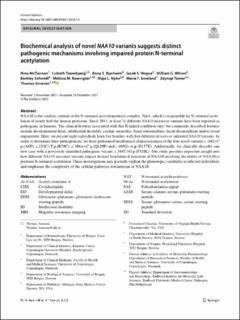Biochemical analysis of novel NAA10 variants suggests distinct pathogenic mechanisms involving impaired protein N‑terminal acetylation
| dc.contributor.author | McTiernan, Nina | |
| dc.contributor.author | Tranebjærg, Lisbeth | |
| dc.contributor.author | Bjørheim, Anna Steensen | |
| dc.contributor.author | Hogue, Jacob S. | |
| dc.contributor.author | Wilson, William G. | |
| dc.contributor.author | Schmidt, Berkley | |
| dc.contributor.author | Boerrigter, Melissa M. | |
| dc.contributor.author | Nybo, Maja L. | |
| dc.contributor.author | Smeland, Marie | |
| dc.contributor.author | Tümer, Zeynep | |
| dc.contributor.author | Arnesen, Thomas | |
| dc.date.accessioned | 2022-06-01T12:37:08Z | |
| dc.date.available | 2022-06-01T12:37:08Z | |
| dc.date.created | 2022-05-11T10:36:54Z | |
| dc.date.issued | 2022 | |
| dc.identifier.issn | 0340-6717 | |
| dc.identifier.uri | https://hdl.handle.net/11250/2997244 | |
| dc.description.abstract | NAA10 is the catalytic subunit of the N-terminal acetyltransferase complex, NatA, which is responsible for N-terminal acetylation of nearly half the human proteome. Since 2011, at least 21 different NAA10 missense variants have been reported as pathogenic in humans. The clinical features associated with this X-linked condition vary, but commonly described features include developmental delay, intellectual disability, cardiac anomalies, brain abnormalities, facial dysmorphism and/or visual impairment. Here, we present eight individuals from five families with five different de novo or inherited NAA10 variants. In order to determine their pathogenicity, we have performed biochemical characterisation of the four novel variants c.16G>C p.(A6P), c.235C>T p.(R79C), c.386A>C p.(Q129P) and c.469G>A p.(E157K). Additionally, we clinically describe one new case with a previously identified pathogenic variant, c.384T>G p.(F128L). Our study provides important insight into how different NAA10 missense variants impact distinct biochemical functions of NAA10 involving the ability of NAA10 to perform N-terminal acetylation. These investigations may partially explain the phenotypic variability in affected individuals and emphasise the complexity of the cellular pathways downstream of NAA10. | en_US |
| dc.language.iso | eng | en_US |
| dc.publisher | Springer | en_US |
| dc.rights | Navngivelse 4.0 Internasjonal | * |
| dc.rights.uri | http://creativecommons.org/licenses/by/4.0/deed.no | * |
| dc.title | Biochemical analysis of novel NAA10 variants suggests distinct pathogenic mechanisms involving impaired protein N‑terminal acetylation | en_US |
| dc.title.alternative | Biochemical analysis of novel NAA10 variants suggests distinct pathogenic mechanisms involving impaired protein N-terminal acetylation | en_US |
| dc.type | Journal article | en_US |
| dc.type | Peer reviewed | en_US |
| dc.description.version | publishedVersion | en_US |
| dc.rights.holder | Copyright The Author(s) 2022 | en_US |
| cristin.ispublished | true | |
| cristin.fulltext | original | |
| cristin.qualitycode | 1 | |
| dc.identifier.doi | 10.1007/s00439-021-02427-4 | |
| dc.identifier.cristin | 2023390 | |
| dc.source.journal | Human Genetics | en_US |
| dc.identifier.citation | Human Genetics, 2022. | en_US |
Tilhørende fil(er)
Denne innførselen finnes i følgende samling(er)
-
Department of Biomedicine [710]
-
Registrations from Cristin [9791]

